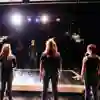





Our students go on to work for some of the world's most prestigious theatres. The artistic directors of both the National Theatre and the Royal Court Theatre are Hull drama graduates.
Join our tight-knit community of creatives. Actors, performers, producers, directors, designers - you’ll get the chance to work with all of them.
From your very first week, you’ll be learning on the job. And you’ll hone your acting skills in regular performances throughout your degree, as well as be invited to regular masterclasses, workshops, and guest shows with our industry partners.
About this course
BA Acting is a practical, production-based degree, delivered in partnership with Middle Child Theatre Company and Prague Quadrennial.
Most of our modules are practice-based. You work on various performance projects within a production ensemble setting. The rest of our modules focus on the practical training (such as voice and movement) and theatre knowledge you need to be a professional actor. You learn on-the-job, starting work on your first production in week one. And you’re involved in regular production work right up until the end of your third year.
You get exclusive access to our fantastic theatre facilities. Our Gulbenkian Centre is the most flexible theatre space at any European university. Inside, you’ll find studio performance spaces, rehearsal rooms, design studios, and a costume department.
You’re invited to regular masterclasses, workshops, and guest shows with our industry partners. These include Arts Council England National and Portfolio Organisation, Middle Child Theatre Company. And Prague Quadrennial, the world festival of scenography and performance design. You also get to work with students across Drama, Game and Graphic Design, and Media Production.
The final curtain is just the beginning
Module options
Each year, you’ll study modules worth a certain number of credits, and you need 120 credits per year. Most modules are 20 credits – so you’ll study six modules each year. Some longer modules, such as a dissertation, are worth more. In these cases, you’ll study fewer modules - but the number of credits will always add up to 120.
Filters
Approaches to Theatre Exploration
How do processes of making theatre inform our understanding of drama? Can we develop the same kinds of insights by doing as we can by reading? Are ‘embodied’ insights qualitatively different, and how might they be communicated? In this module you will explore the creative and cultural context of performance by engaging in processes of production.
compulsory
20 credits
Drama Industry Case Study
How should you prepare for your career in the creative industries? In this module you will explore the roles that interest you, discover what the professionals really do, and find out how to maximise your future employment opportunities across this vibrant and growing sector by making effective choices right now.
compulsory
20 credits
Introductory Performance Techniques
Develop practical and theoretical skills in theatre making. You'll work with your peers to create short devised performances, responding to plays from classical, Renaissance and contemporary theatre.
compulsory
20 credits
Production Project
In this module you will be introduced to the processes and expectations of production practice. You will have an opportunity to shape your first production to consolidate the experience you have gained before coming to university.
compulsory
20 credits
Movement and Voice
Develop skills in areas of performance practice and develop basic competencies to enable you to engage in production practice later in the programme.
compulsory
20 credits
Approaches to Theatre Discourse
What intellectual and conceptual skills do we need to develop to become well rounded creative practitioners? How can discursive modes of enquiry like reading, discussing and presenting to peers inform our understanding of drama? How might we communicate our ideas to others? In this module you will explore the creative and cultural context of performance by engaging in critical, contextual and historical material.
compulsory
20 credits
Live and Recorded Media
In this module you will work with specialist students from other programmes to deliver fully realised media work (screen and recorded). The skills you develop here will add to your developing CPD profile and the outcomes of these projects will contribute material to your professional showreel.
compulsory
20 credits
Theatre Practice: Research and Development
How should I plan for a major creative project? In this module you will bring together specialist skills that you have developed in techniques modules with culture making skills that you have looked at in Performance Perspectives modules to propose and plan a production project that you will complete next semester.
compulsory
20 credits
Intermediate Technique
Develop your skills and understanding in one of the following production areas: scenography; stage management; play and scriptwriting.
compulsory
20 credits
Our facilities

Watchlist
Dr Lucy Fielding
Course overview
2 mins
Alumnus James Graham
Student Story
2 mins
The Gold Standard for Teaching
University life
1 min
Life on campus
University life
2 mins
Featured academics
From directing plays to working on virtual theatre resources, our staff are active in the industry. And they bring their experience into everything you learn.
We also work closely with our industry partners, who help deliver the programme on a weekly basis.

Dr Lucy Fielding
Lecturer
Lucy directed the new play 'Safer' by Dr Sarah Jane Dickenson, which toured Hull Pride, Birmingham Commonwealth Games, and Brighton Fringe Festival among other venues.

Dr Cat Fergusson-Baugh
Lecturer / Director of Drama
Cat has been a digital researcher & practitioner at Hull since 2007, specialising in theatre history, XR & digital performance. Cat's work spans Channel 4, Prague Quadrennial and projects from Drury Lane reconstructions to Oculus and binaural audio.
Entry Requirements
What do I need?
This course is currently available through Clearing, which means our entry requirements are a bit different to what they would normally be.
At Hull, you're a name not a number. During Clearing, we look at all of your qualifications and experience, not just your academic grades. We may be able to offer you a place whatever your situation. Get started by completing our eligibility checker, and find out immediately if you could study at the University of Hull.
Have questions? Our admissions team will be happy to help.
Fees & Funding
How much is it?

Future prospects
Our students go on to work for some of the world’s most prestigious theatres and companies, such as the Royal Court Theatre, the National Theatre, the Royal Shakespeare Company, the Royal Opera House, and the Bouffes du Nord in Paris. Many go into broadcasting, including for the BBC, Channel 4 and Sky.
Our alumni are illustrious. Playwright James Graham, Indhu Rubasingham (Artistic Director of the National Theatre), David Byrne (Artistic Director of the Royal Court), theatre director Marianne Elliott, musical director Martin Lowe, and award winning sound designer, Paul Arditti.
Become part of the next generation of futuremakers
Like what you've seen? Then it's time to apply.
The standard way is to apply through UCAS. This will give you the chance to showcase your skills qualities and passion for the subject, as well as providing us with your academic qualifications.
Not ready to apply yet?
Visit our next Open Day, and see all that the University of Hull has to offer. Talk to our lecturers about your subject, find out what university is really like from our current students, and take a tour of our beautiful campus and amazing facilities.
You may also be interested in...
100% employability (Drama) UK domicile full-time first degree leavers; Higher Education Graduate Outcomes statistics, for the academic year 2022/23, published by the Higher Education Statistics Agency June 2025.
All modules presented on this course page are subject to availability and this list may change at any time.